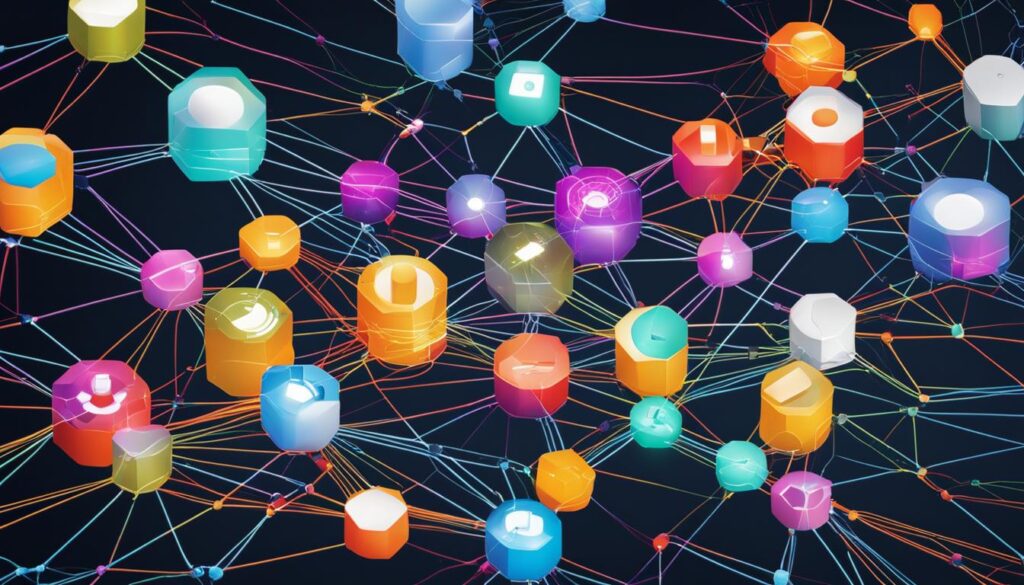Imagine a world where scientific advancements and technological breakthroughs are transforming the landscape of various industries, from healthcare to finance, transportation to energy, and beyond. This is the world of emerging technologies, where the latest trends and innovations promise to shape the future like never before.
In this article, we will explore the exciting world of emerging technologies, discussing the latest scientific advancements, future trends, and groundbreaking breakthroughs that are revolutionizing our world. From artificial intelligence to blockchain, biotechnology to quantum computing, and renewable energy to the Internet of Things, each technology promises to bring significant change.
Stay with us as we delve into each technology’s potential and implications, providing a glimpse into the world of tomorrow. Are you ready to explore the future of technological innovation? Let’s dive in!
The Rise of Artificial Intelligence
The field of artificial intelligence (AI) has seen significant growth in recent years, with remarkable advancements and applications across industries. AI is transforming businesses and society through machine learning, deep learning, and automation, allowing for the development of intelligent systems and processing of large amounts of data that were previously unimaginable. With this rise in AI, comes both opportunities and challenges.
One of the key benefits of AI is the potential for automation, which can help increase efficiency, reduce costs, and improve accuracy. For instance, tasks that were previously manual, such as data entry or quality control, can now be performed by intelligent machines, freeing up time and resources for other important tasks. Another advantage is the ability for machines to learn based on data, leading to more precise predictions and decision making.
Despite the tremendous potential, there are also concerns about the impact of AI on jobs and society. Automation and AI could result in job displacement, requiring new skills and job roles. Additionally, there are concerns about privacy, security, bias, and the ethical implications of autonomous systems. Therefore, it is critical to ensure that AI development and implementation are responsible, transparent, and aligned with human values.
“The pace of progress in AI is incredibly fast. Unless you have direct exposure to groups like Deepmind, you have no idea how fast—it is growing at a pace close to exponential. The risk of something seriously dangerous happening is in the five-year timeframe. 10 years at most.” – Elon Musk
As AI continues to evolve and improve, it is important to consider the potential impact on society and address any concerns. With responsible development and utilization, AI has the potential to transform industries, solve complex challenges, and improve our lives in numerous ways.

Harnessing the Power of Blockchain Technology
Blockchain technology has been the buzzword in the world of finance and banking, thanks to the rise of digital currencies like Bitcoin. But the potential of blockchain extends far beyond cryptocurrencies. At its core, blockchain is a decentralized digital ledger that records transactions securely and transparently. This revolutionary technology offers a range of advantages such as immutability, security, and transparency.
One of the key benefits of blockchain is its decentralized nature. Blockchain technology enables peer-to-peer transactions without the need for intermediaries such as banks or other financial institutions. This decentralized network ensures that transactions are completed quickly and accurately, with no single entity having complete control over the network.
Smart contracts are another key application of blockchain technology. These self-executing contracts are coded into the blockchain, where they are automatically executed when certain conditions are met. This has various applications, from managing supply chains to automating financial transactions.

The potential of blockchain technology is vast, with implications across various industries and sectors. In finance, blockchain technology can streamline transactions, enabling faster and more secure payment processing. In healthcare, blockchain can be used to securely store and share patient data, facilitating the creation of more personalized and effective treatments. In supply chain management, blockchain can enable full traceability and transparency, from the source of goods to final delivery.
The rise of blockchain technology is set to revolutionize various sectors, offering a secure, transparent, and decentralized alternative to traditional systems. As this technology continues to evolve and gain traction, it promises to be a game-changer for the world of finance and beyond.
The Internet of Things: Connecting the World
The Internet of Things (IoT) is a rapidly growing network of interconnected devices that has the potential to revolutionize various industries. By connecting devices and enabling communication between them, IoT devices offer endless possibilities for data analysis and automation.
The current applications of IoT are vast and varied, ranging from smart homes and wearables to industrial automation and smart cities. These devices allow for enhanced monitoring, tracking, and control, improving efficiency and productivity.
However, with increased connectivity comes increased vulnerability to security breaches and privacy concerns. As the number of IoT devices continues to grow, so does the need for robust security measures to safeguard against cyber threats.
Looking ahead, the potential for IoT is limitless. From improved healthcare and transportation to more sustainable living, the possibilities for IoT devices are truly endless.

Exploring Potential Breakthroughs in Biotechnology
Biotechnology is a rapidly advancing field that has the potential to revolutionize healthcare and other industries. One major area of focus is genetic engineering, which allows scientists to edit the genes of living organisms for various purposes, from developing disease-resistant crops to curing genetic disorders.
Another exciting area in biotechnology is regenerative medicine. This involves the development of new tissues and organs to replace damaged ones, making it possible to treat conditions that were previously incurable. Precision medicine is another promising area, which involves tailoring medical treatments to an individual’s specific genetic makeup.
While the potential benefits of biotechnology are undeniable, there are also ethical considerations to take into account. For example, genetic engineering raises concerns about the potential for designer babies and the long-term effects of altering the human genome.

| Application | Description |
|---|---|
| Gene Editing | Allows scientists to modify DNA sequences for various purposes, including creating disease-resistant crops and curing genetic disorders. |
| Regenerative Medicine | Develops techniques for growing new tissues and organs to replace damaged ones, making it possible to treat conditions like heart disease. |
| Precision Medicine | Tailors medical treatments to an individual’s specific genetic makeup, improving the effectiveness of treatments and reducing side effects. |
“Biotechnology has the potential to transform healthcare and other industries, but it’s important to carefully consider the ethical implications of its development.”
The Power of Quantum Computing
With the traditional binary computing system reaching its limits, quantum computing has emerged as a game-changing technology. Quantum computers, by exploiting the power of quantum mechanics, can perform complex calculations at a much faster rate than classical computers.
The basic building block in quantum computing is qubit, which can represent multiple states simultaneously through a concept called superposition. This enables quantum computers to consider all possible solutions at once, making them ideal for optimization problems and cryptography.
Quantum computing also has the potential to revolutionize fields such as simulation, where current computing capabilities are limited. For instance, quantum simulation can be used for drug discovery and material science, where complexity and interaction between particles cannot be accurately modeled by classical computers.
“I think quantum computing is going to be transformative…It has the potential to change so many things about how we design systems, how we understand systems, how we analyze data.” – Dan Huttenlocher, Dean and Vice Provost at Cornell Tech
As quantum computing technology continues to advance, it has the potential to revolutionize various industries and transform the way we understand the world.
Advancements in Renewable Energy Technologies
Renewable energy is becoming an increasingly important solution to the global energy crisis and climate change. In recent years, significant advancements have been made in clean technologies, such as solar power and wind energy.
Solar power is a particularly promising area of renewable energy, as it has become more affordable and efficient in recent years. Advancements in technology have also led to the development of more versatile and user-friendly solar panels, which can be integrated into various structures and devices.
Another significant area of renewable energy is wind energy, which has also seen substantial improvements in efficiency and affordability. Many countries around the world are investing in wind energy projects, and technological advancements such as larger turbines and advanced control systems are making it a more viable solution for meeting energy needs.
| Renewable Energy Source | Advantages | Disadvantages |
|---|---|---|
| Solar Power | Reduced greenhouse gas emissions, low operating costs, renewable | Intermittent power supply, high upfront costs, dependence on sunlight and weather conditions |
| Wind Energy | Reduced greenhouse gas emissions, low operating costs, renewable | Intermittent power supply, potential impact on wildlife, high upfront costs for installation and maintenance |
“Renewable energy holds tremendous promise for reducing our reliance on fossil fuels and mitigating climate change.” – Elon Musk
As renewable energy technologies continue to evolve and improve, they present an increasingly viable solution for addressing the world’s energy needs while also reducing our impact on the environment.
Conclusion
This article has provided a glimpse into the world of emerging technologies, scientific advancements, future trends, and technological breakthroughs. From artificial intelligence to blockchain, biotechnology to quantum computing, renewable energy to the Internet of Things, these fields promise to shape our future. It is essential to keep informed about the latest trends and developments in these exciting areas.
Staying ahead of the curve requires continuous learning and adaptation. The cutting-edge technologies and developments discussed in this article are signs of the pace of progress, and we are bound to see more advancements in the future. By incorporating these technological breakthroughs into our lives and work, we can look forward to a better future.
As these emerging technologies continue to develop, they will undoubtedly create both opportunities and challenges. By embracing and harnessing their potential, we can pave the way for a brighter future. The possibilities are endless, and the future is yet to unfold. Stay curious and stay informed!
Stay tuned for more exciting updates in the world of emerging technologies, scientific advancements, future trends, and technological breakthroughs!
